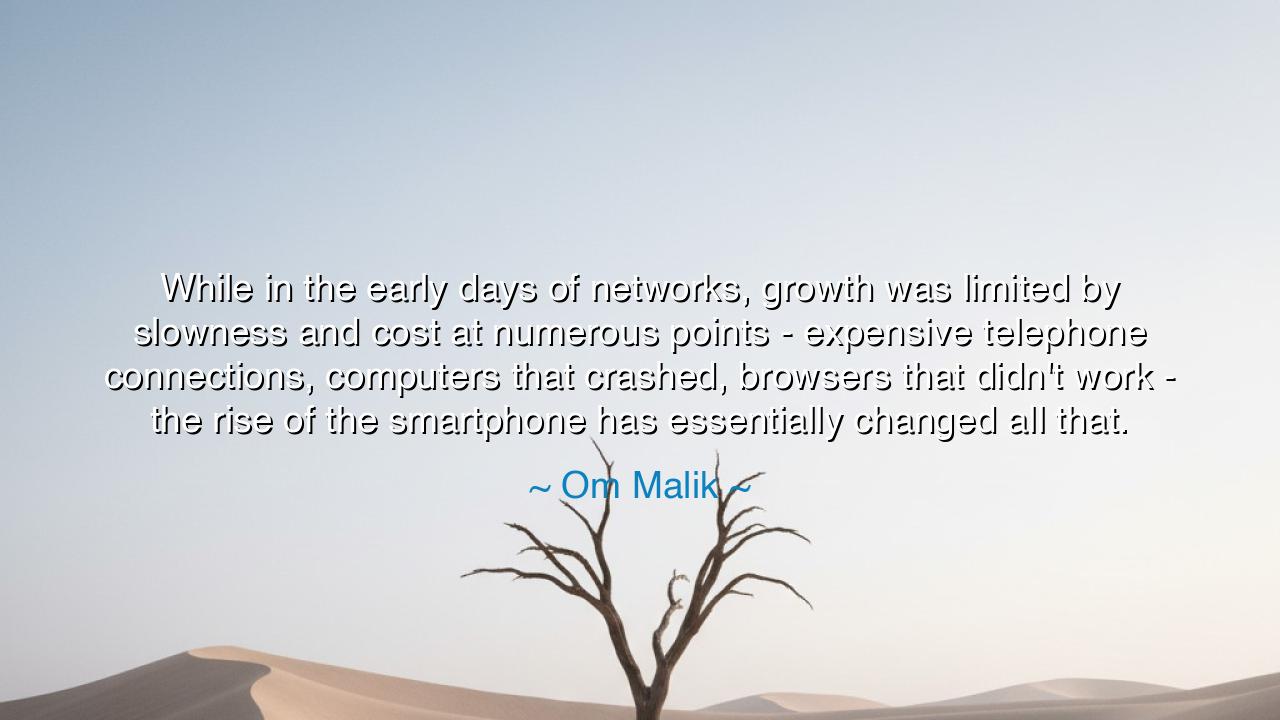
While in the early days of networks, growth was limited by
While in the early days of networks, growth was limited by slowness and cost at numerous points - expensive telephone connections, computers that crashed, browsers that didn't work - the rise of the smartphone has essentially changed all that.






Hearken, O children of generations yet unborn, and attend to the words of Om Malik, who spoke of the transformation of human connection: “While in the early days of networks, growth was limited by slowness and cost at numerous points — expensive telephone connections, computers that crashed, browsers that didn't work — the rise of the smartphone has essentially changed all that.” In these words lies a meditation on innovation, perseverance, and the triumph of human ingenuity, reminding us that obstacles are often temporary, and that transformation arrives when vision meets relentless effort.
Consider first the early limitations of networks. In the infancy of digital communication, humanity faced countless barriers: connections were costly, computers fragile, and browsers unreliable. These challenges, though mundane, shaped the possibilities of an entire generation. It mirrors the struggles of ancient engineers who sought to build aqueducts, bridges, and roads across mountains and rivers. The toil, the errors, the repeated failures were part of a process that demanded patience and vision beyond immediate obstacles.
Malik’s words emphasize the importance of perseverance in the face of limitation. Early networks were slow and frustrating, yet pioneers persisted. Consider the story of Tim Berners-Lee, who in 1989 conceived the World Wide Web despite minimal resources and the skepticism of peers. His creation, built upon imperfect systems, laid the foundation for global connectivity. Malik’s observation reminds us that progress often begins in the shadow of frustration, and only through dedication do the seeds of transformation bear fruit.
The rise of the smartphone, Malik notes, changed all that. This device, small enough to fit in a hand, powerful enough to connect billions, became the portal through which the world accessed knowledge, communication, and commerce. Just as the printing press transformed literacy and thought centuries earlier, the smartphone democratized access to information, collapsing distance, reducing cost, and overcoming prior limitations. It is a testament to the power of design and innovation to overcome structural barriers.
There is also a lesson in adaptability. While early networks struggled under technical limitations, innovators did not abandon the pursuit of connection. Similarly, in the Renaissance, artists and scientists like Galileo faced resistance from authority and primitive tools, yet persisted in experimentation. Malik’s words remind us that technology evolves through both challenge and human ingenuity, and that breakthroughs often arrive when persistence meets the right medium.
From this reflection emerges a timeless lesson: limitations are not permanent barriers but invitations to innovate. The frustrations of the past, whether expensive lines, crashing machines, or slow browsers, were the crucible that forged the vision of what connectivity could become. The smartphone did not arise from ease, but from decades of persistent labor, imagination, and courage to reimagine what was possible.
Practical action flows naturally from this wisdom. Embrace challenges as opportunities for innovation. Seek solutions where others see impossibility, and remain persistent despite obstacles. Learn from history: every great transformation, from aqueducts to printing presses, from the Internet to smartphones, began as a struggle against limitation. Your efforts, patience, and vision may overcome the barriers of your own time.
Finally, remember the eternal truth: the arc of technological progress bends toward ingenuity, accessibility, and empowerment. Om Malik’s words are a call to witness and participate in this evolution, to see obstacles not as endpoints but as catalysts, and to embrace the tools that transform the world. In understanding the past limitations, we appreciate the triumphs of the present and prepare ourselves to shape the innovations of the future.
If you wish, I can also craft a narration-ready version of this reflection, with sweeping rises and falls to highlight the drama, struggle, and triumph in Malik’s insight.






AAdministratorAdministrator
Welcome, honored guests. Please leave a comment, we will respond soon